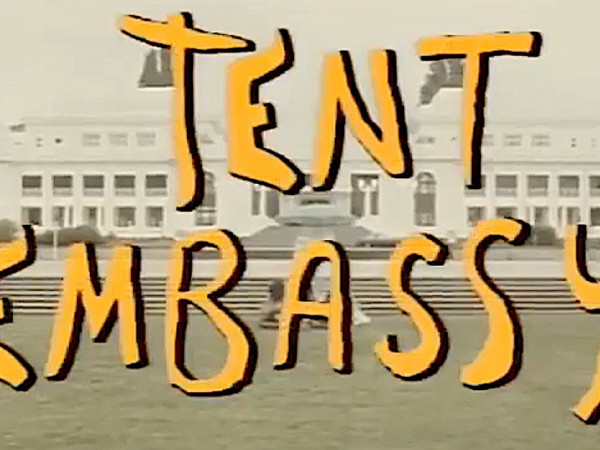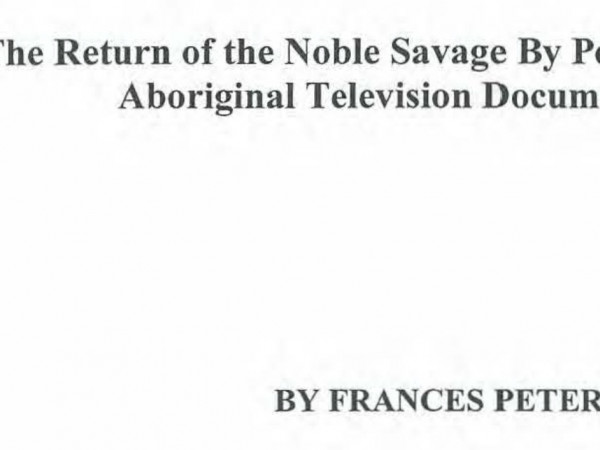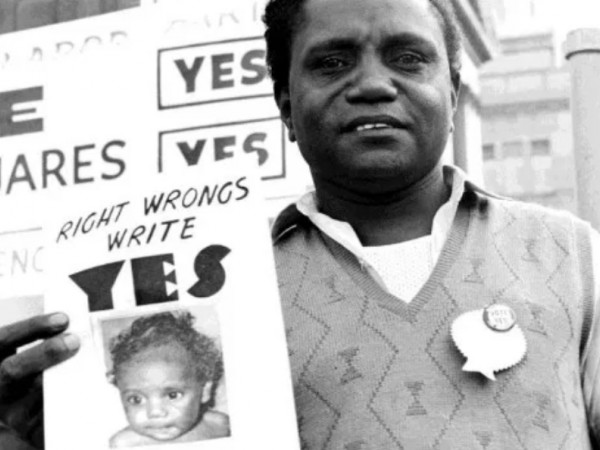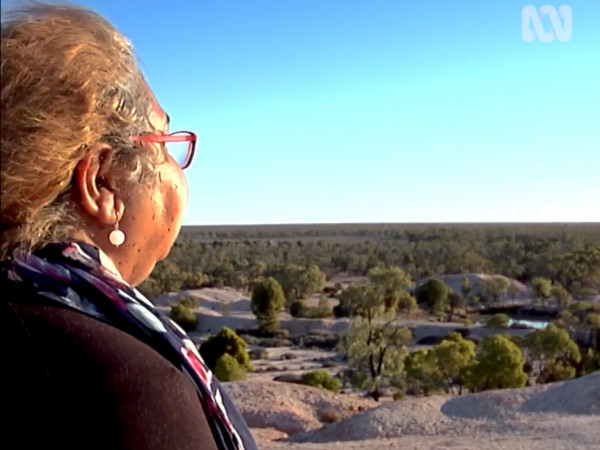Frances Peters Little
“We aren’t going to be homogenised…”
I got into television really by accident. It was never anything that I'd planned or. You know. Didn't think about it at all really. I mean I, I got into UTS - University of Technology in Sydney – And I was mostly into radio. At that time I was… doing some radio, Community radio. It was called Radio Skid Row then. And they'd have an Aboriginal program in there. And so that was all good, and I was doing that for a while with people like Tiga Bales. I did a bit of radio work with Lester Bostock, and both of whom, you know, have since passed on. So it's going back a while - in the mid 80s. And it was then I got a phone call from ABC TV who were embarking on a new program which was going to be called Blackout. And I had no television experience whatsoever. So, when someone rang me and said all we need someone you know, it's a researcher. And I said ‘Oh look I don't know anything about television’. They said ‘Well just think of it like this: it's going to be radio with pictures’. So, I said ‘Okay’ – they said ‘Can you come over for an interview?’ And I said ‘Yes, sure’.
And they said ‘Well can you come over now, we'll pay your cab fare…’ And so, I was thinking they must be looking for somebody, so I get a cab or go all the way from Sydenham - I was living in Sydenham at the time, still a student and Sydenham's right on the flight path. You know, we used to wash up in the kitchen and see the wheels go by our window. And so, you know I go over to Gore Hill [ABC TV Studios]. I meet the new guy who was going to be the series producer and I met the executive producer who was Vaughan Hinton, and sat down and talked about the concept that they had for this new program that they were going to make called Blackout.
….and we talked about different ideas and how the place was set up and, you know, I’d met the other Aboriginal people who have been working in the unit - at that time it was called the Aboriginal Programs Unit. And you know, I was really broke. I was a broke student. I mean, you know I was living on noodles, you know. And, you know, packets of chips. And they said ‘Well this is how much we pay…’ And, you know, and I said ‘Well when can I start?’. And they said ‘Well, what are you doing for the rest of the day?’. I said ‘Nothing. Let's go!’
…the time I went over there for the interview, the Aboriginal Programs Unit was already in operation – it started in 1997 and that year’s pretty significant, in fact that it’s leading up to the 1988 bicentenary …celebrations here in Australia which is all about, you know when Australia became ‘a nation’, you know. And…when the Union Jack was planted, that kind of thing. And so Aboriginal people had nothing to celebrate. So, there was some kind of social conscience - you know, not just Aboriginal people but non-Aboriginal people, who could see the need for why there had to be some involvement and perspective of Aboriginal people leading up to the Bicentenary Celebrations, which we didn't call celebrations but, you know something else. You can imagine. And… so, then the unit was already in operation. They'd already had run programs to air in 1987 - there was a documentary that had been made by Tim Everett leading up to the long march which was going to be the Aboriginal protest in 1988. There was a series that - it was more about you'd show old or, you know documentaries that had already gone to air. And after each screening of each of the programs there would be a panel. And on that panel were people like Justine Saunders, Brian Sara and Gary Foley, Jim Everett and many other Aboriginal activists and artists. And they would make a commentary on each of the programs. And so, it was a way of being able to show an Aboriginal perspective to all the documentaries that had been previously screened and made at the ABC by non-Indigenous people. So, there was some sort of feedback - and in many cases, you know some of the feedback and comments made by the Aboriginal people on the panel were very supportive of some documentaries, and very critical of others. So that was important, and of course, what people repeatedly said at that time was ‘When are Aboriginal people themselves was going to be making and producing documentaries that are made about Aboriginal people from their point of view?’. And I think that that was an exciting kind of question - people were prepared, well, you know that sort of question and being able to be seen on television…. David Hill was the general manager of ABC at that time. And so, …they more or less threw some money into the idea of Aboriginal Programs Unit, and to then take this experimental idea, and run with it: that okay, if Aboriginal people have got to say something about their stories from their perspective, let's see what that's like. And so, by the time in 1989 when Blackout did happen, the first series of Blackout was a magazine format where you'd have a couple of Aboriginal presenters that would cut to various stories around Australia, of journalists, you know sort of doing you know little five or ten minute segments. And then it’d all get edited together, and then be screened once a week on the first series. That was a half hour program and that would then…you know, they would do that and run that for about 20 weeks of Blackout. So that was the first series of Blackout.
Then, the second series was, when that came around, that was when I got the phone call. They already knew me in some way, and said we need someone to be a researcher on the second series, because the second series of Blackout was not a magazine format. It was more half-hour documentaries. And…that was exciting for me because I always liked documentaries rather than, you know, drama and, you know I always thought documentaries were good. And that was interesting because at a time that there were a lot of people complaining, you know a lot of Aboriginal people who, you know I knew in the media, were saying ‘We’re sick to death of having documentaries made. When are we going to start doing drama?’ But I thought well…drama is great and everything, but I love documentaries and I always will..
In the first series I was more of a researcher - I mean, the second series of the documentary format -I was the researcher. And then in the third series of Blackout I started to learn to direct and produce, and write my own documentaries.
You know I remember the daily routine of working in an Aboriginal Programs Unit at the ABC, working on the Blackout series. And, you know we’d sit around and, you know there was a real interest and amount of support for, you know white producers, white executive producers and all that saying ‘Well then. you know what are your stories?’, you know. I mean at least they were sensitive to the idea of what is and how…’You know, we've been making documentaries about Aboriginal people forever. So how do you make those programs?’ -and these were the discussions we'd have in our production meetings, which really …we’d affectionately referred to as Brain Drains. And you know we…we’d ask that question all the time. There'd be six… producers and directors and researchers - all Aboriginal - sitting around talking, you know all the time about our ideas, and saying ‘Well, is it enough to do … a positive story about Aboriginal person who became a doctor or… whatever’, and then sort of asked the question ‘Well, because we're Aboriginal how do we do films that are different to how… You know, it's not that easy, you know to ask that question: how do I, as an Aboriginal person make a film differently to a non-Aboriginal person? You know, some people think that they are simple … it’s not.
Yes, some of the constraints of working at that time you know: perhaps at that time I was learning you know, I was learning. One of the things was not just to say like ‘How do I make a documentary film about Aboriginal people that a non-Aboriginal person would do?’ …But then the bigger question came through was ‘How do I make a documentary film for a white audience?’ And then you have to ask yourself the question ‘Well, what white audience? You know, who am I actually talking [to]? Am I in my sort of trying to communicate with the white people that I went to uni with? Am I trying to communicate with the white people who work in the ABC? Am I trying to communicate with ‘Mr. and Mrs. Suburb’ or, you know, the executive producer’s wife? You know, who am I actually trying to reach…?’ And so, they become really complicated and of course that's going to be, you know, a lot of pressure.
And you know I'm someone who grew up in an Aboriginal family - both parents.I grew up in an Aboriginal community, I grew up with a very strong Aboriginal cultural and political beliefs, and all this sort of stuff. However, the next person, the next Aboriginal person, may not have the same. So how was their perspectives different? You know, the assumption that all Aboriginal people share a view about who we are, and what our stories ought to be and who we think we're speaking to - there's no one, you know, there's no one paint fits all – so, you know we all have to think about those questions. So, I mean it was it was difficult. I feel frustrated because for once I was working in a bureaucracy - there's no doubt about it. You know, the ABC is a bureaucracy. And…but there was another thing that, you know in hindsight, that I can look at and say that while the ABC was changing me – and there's no doubt about that, changing in way that I thought of things - I think we were changing the ABC in some parts. And so that, you know there was certain things that what we would go through, we'd say things like ‘Well, you can't just wander into an Aboriginal community and just shoot anyone that, you know, do a story about anybody or anything without at least consulting, without sort of getting, you know, releases, without sort of like developing your relationship with the people that you're filming. You can't assume that just because you're Aboriginal, that you can just wander…we need to think about what you know…’, we didn't call them protocols and guidelines. We just called them common sense, and then the thing was, you know…. so, yeah, we were, you know, our film crews were non-Aboriginal people, and you know, and then our executive producers and all that. So, we come back and say no this is how we need to do it because, we know, I'm not going to walk into my community and make… I've got to live with the repercussions of that.
After you know, Blackout, I worked on a couple of episodes for Blackout series. Then I was given an opportunity to make a one-off, one-hour documentary that was … you know at the ABC at that time. And it was called Tent Embassy, and that was a one-hour Doco that you know I wrote and produced. And it was looking at the 20th anniversary of since the Tent Embassy was set up on Parliament House in Canberra in 1972. And that was really difficult because of the people that I had to meet were all these late 70s radical as you know. So, I had to get I had to get it right… you know, I won't get into it but you know there were some people boycotting it. Some people you know, whatever - but you know, even to this day I was get a lot of people saying ‘Thanks for making the film’,because at the time that I'd made the film ..in ’92, there were a lot of people who'd been born and never even heard of the Tent Embassy.
So that was really good to capture that period of time and I've had people who were once critical like Gary Foley say that, you know, he thought it was a brilliant film and one of the best ones you've ever seen about the Tent Embassy.
So then after that in 1992 I met a couple of people. One was Professor Faye Ginsburg who was based at New York University in the Anthropological Department. And they'd set up a media and culture and history department. And she'd ask if I was interested in coming to New York.
So, of course I went and while I was there…I remembered what it was like to write and, and I'd missed all of that you know because I, you know, getting into television was a distraction. It took me off another path. I went to university, to write about things and, you know…. then television came along. And so, then I had something to write about.
I decided to do my masters and while I was doing my master's degree I got a phone call from, you know SBS TV saying…You get these phone calls you know!… And television, like Aboriginal television, had gone off in a completely different spin to what it was like when I was there in the 80s and the early 90s, because more people were interested in what they were always saying ‘We need to make more drama. We're sick to death of documentary.’ Well you know, I still, you know thought ‘What's wrong with both you know?’. But anyway, they’d spin off into another direction. And, but the phone call that I got to go to make this documentary… because it was now celebrating, you know, it was the upcoming 40th anniversary since the 1967 referendum.
.And I did then make the documentary called Vote Yes for Aborigines. And that screened on AB.. SBS Television, on the 27th May 19…2007, which was the actual 40th anniversary. And. So you know I fell in love again, I suppose with making films. And it was historically based - as was Tent Embassy was historically based. And the degree that I had done at the ANU was History. So, you know it was combining those things.
I think I'm looking at Satellite Dreaming, and some of the things that were coming through there, I think there was a little bit too much of a harsh criticism, against me and the other Aboriginal people who work at the ABC - as being people who were puppets and mindless, and that we were being controlled only by white people in terms of, you know, how we were going to make films and what we were going to say. Well that's not true. That was definitely not true … I would dare anybody to tell me how to think and what to say and how to do it. You know I was never that sort of person, I was a lot cheekier than I am now. And you know, and so were we all. And so that's one of the criticisms I had about the film, that there was this criticism made by different people in the film. And the other thing that I had a problem with… Satellite Dreaming was that there seemed to be a sort of an idealization of that, that the ‘real’ Aboriginal television, the real, you know, purity of Aboriginal Film and Television making only came from Central Australia. And I think that's, you know that's …downright wrong. And I think it's also a little bit racist. I think it's …it's a bit ‘noble savage’ in my mind that, you know you have to only be a ‘real’ Aboriginal person to make ‘real’ Aboriginal films. I thought that was naive, and I think it was disrespectful to us. And we were working… we were ‘real’ too, you know, and it was because we were urban, and we were working for a, you know, a national television broadcaster. So. But, having said that in terms of what Satellite Dreaming was like and where we are now I think there's some wonderful things that have occurred, you know, where to Aboriginal television has gone, and some of them you know, I think we're sort of settling in a bit, or the sands are sort of settling, because what people are doing at CAAMA, or what people are doing in central area, in central Australia or in remote areas is very different to what's been happening in the city. And we now accept that.
In the beginning, back in those days in the late 80s, early , there was seen to be this thing, you know people were scrambling a little bit to sort of think, you know what is Aboriginal television. Well at least now 25 years or whatever it is later, we now realise that it's many, many things, and many different Aboriginal people can make them. And look at the filmmakers we have now, you know. A lot of them still love drama … and doing less documentary. That's still happening. And I wish there was more you know… But then we've got, you know NITV that does a lot of you know, news programs and magazine programs: still not enough documentaries. A lot of drama on the ABC. Great series’ like Redfern Now. And you know, I live in Lightning Ridge now and I see a lot of CAAMA television, Imparja television. I see a lot of … with ads! People do advertising and stuff that was unthinkable, you know. So, the sands are settling and, you know we aren't going to be, you know, homogenized, we are going to continue to make you know Aboriginal films in our way for whatever reason and wherever we are. And. It's not up to anybody to be able to say well is this the right way or is that the wrong way. It really is about this is our way.
I don't want to be told what to do. I was a radical when I came in. And I've become worse. You know and I don't want to be told what to do and you know I like doing things on my own you know.
I still have a love for film and television. But I wouldn't want to work in there. And so, with the technology, with social media, I still, you know, do things. There was a time when, you know, I had a hip operation, and I wasn't I wasn't very mobile. And so I did a series of short films called From My Car. And I'd just use my phone. And you know, and I've been filming little short bits and pieces you know, a series from my car. And I thought, you know there's ways of being able to go on you know YouTube, or you know, if you're disabled or if you're a certain age or if you have no technical experience or background, you have access. And you know, it's open now, we can all make these films- they don't have to be for great big wide audiences, you don't have to walk down a red carpet. You know you can still be in love with making films and saying…and telling good stories, you know through the visual medium.
I used to say back then, well what I started to say was that Aboriginal people have not got a monopoly on truth, you know. Nobody has. But we do the best that we can and we try to say something that we think that other people have not said enough of, or critique what hasn't been critiqued. And the main thing was to, not just educate, but to make people feel, you know - that was the one thing that I thought changed things for me. You know, I wasn't gonna go in there and get on a soapbox behind the camera. I wanted to go in there and say I want people to feel what it's like to be Aboriginal, and see it our way.




